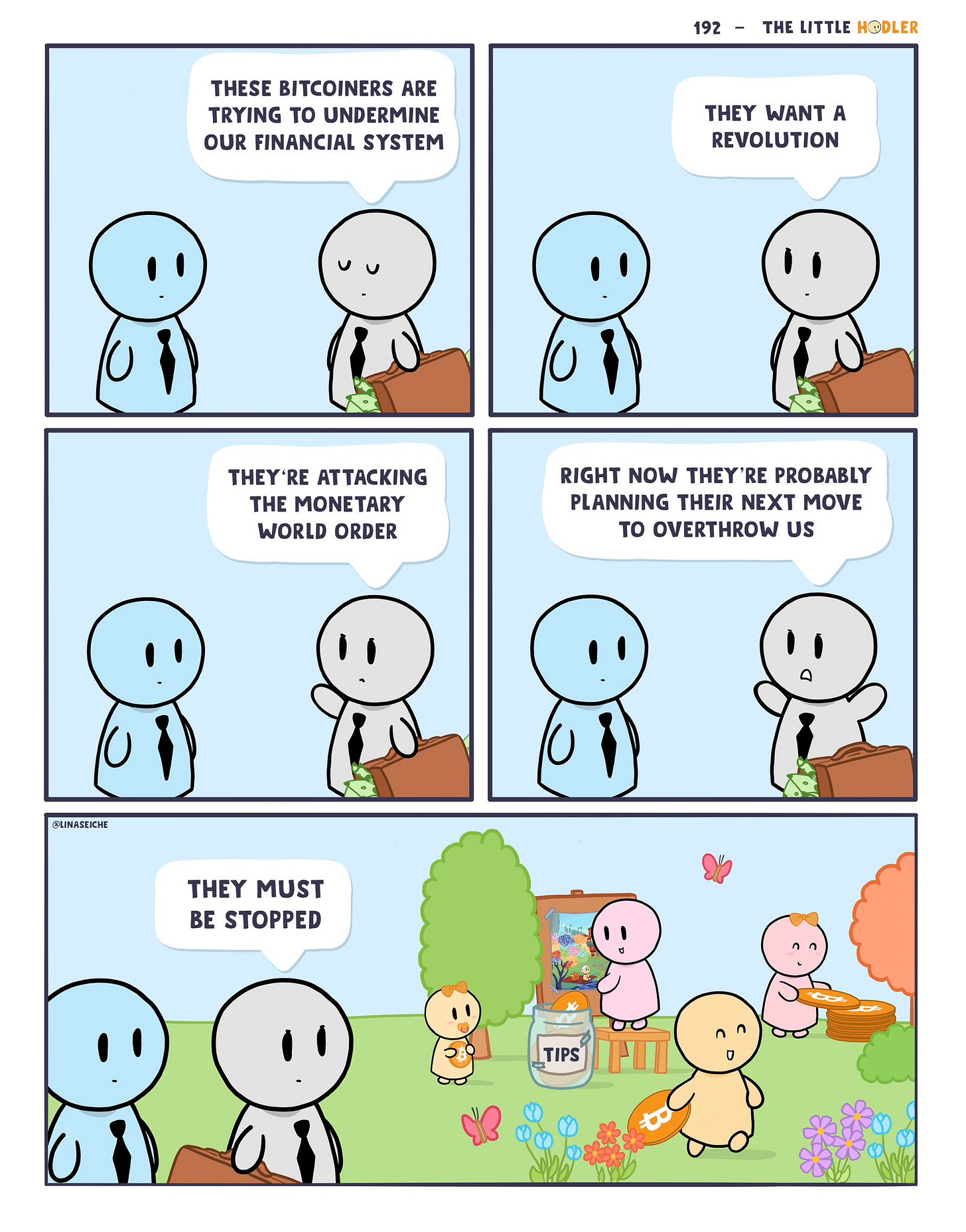Bitcoin Tech Talk #360
Interesting Stuff
Explaining China - Many western, socialist leaning politicians have been praising China recently particularly with regard to their economic growth. This article goes into exactly what was needed to make China grow, particularly the rule-of-law that was facilitated by Hong Kong. As the article points out, without property rights, much of the growth of China would probably not have been. I would also point out that much of the investment in China occurred as a result of people chasing yield and fleeing high labor costs. It was the Cantillon Effects that exported much of manufacturing and in a sense, this is temporary. Once prices get high enough, they go to the next country with cheap labor as it already has been to Vietnam, Cambodia and Indonesia.
Natural Elites - This is a classic article by Hans-Hermann Hoppe about the role of elites and how that’s been corrupted over the years. His main explanation is that the advent of democracy and universal education has essentially destroyed them and that the new class of elites are people dependent on the state. I would add that fiat money has been the funder of the degeneracy of the elite and their focus on hedonism is a clear indicator of their debasement. There will no doubt be a natural elite again under a Bitcoin standard and I suspect many of you reading this will be part of bringing civilization back to a better path.
Do Intellectuals Matter? - The article itself is about psychology and the jumping off point is the scandal around a couple of celebrity professors who have been accused of doctoring their data. The real meat of the article and the question driving the point made is, does their fake data change anything? Did these people discover anything useful for their field that now we have to reconsider? His conclusion is no. The research, whether true or doctored, has no impact on the entire field. I suspect that this is true of almost all academic literature and if this is true, then academia is really a giant rent-seeking operation with little value to society.
What I'm up to
Crowdfund Continues! - Thanks to the crowdfund, we’ve reached our goal of $5000 raised for the book. This crowdfund runs until Wednesday so get your memorabilia for Fiat Ruins Everything!
The Return of Bitcoin Fixes This - I sat down with Parker and Tuur to discuss what’s going on in the market and what the Fed is doing. We talked about the actions of the Fed from before the pandemic and how it led to the weird stagflation situation we have now. Pay attention because things are about to get weird with the economy. My plan is to make my podcast more of a conversation around different topics with a Bitcoin point of view.
Bitcoin Made Simple - I’ve started my rounds on various podcasts and first up is Bitcoin Made Simple. We talked about my new book, the various incentives in different industries like movies, health care, food and the centralization/socialism that all these industries trend toward as fiat money infects them. In particular, the creative output has drastically debased because large-scale things generally have to appeal to the lowest common denominator. Hence why we get sequels and rehashes of the same stuff. Smaller budgets and decentralization will definitely help.
Cafe Bitcoin Spaces - I reviewed BitBlockBoom and talked about my book at this X Spaces during the week. There were a lot of rants by me and I also made the case that the Rich Men North of Richmond is a psy-op.
Bitcoin Muse - I had a lot of fun with this one because we talked about art. It’s the only chapter in the new book that has a trigger warning in front of it and we talked about the modern importance of the artist and the relative unimportance of the art itself. One of the things I got out of the conversation is that if artists want patrons, they need patrons that actually understand and can evaluate art meaningfully. Currently, that’s a political game and the art that makes it to the top is more or less arbitrary. Patrons are those that recognize beauty and realize the artist can produce it.
Nostr Note of the Week
What I’m Shilling
Unchained Capital is a sponsor of this newsletter. I am an advisor and proud to be a part of a company that’s enhancing security for Bitcoin holders. If you need multisig, collaborative custody or bitcoin native financial services, learn more here.
Bitcoin
FROST Private Collaborative Custody - This is a protocol for using FROST with Schnorr to have a collaborator in your multisig setup. What’s particularly interesting about this setup is that the collaborator has no idea what’s being signed and why. The main reason you’d want this is to hide the amount that you have and second to not expose any details of your setup. The process includes a lot of blinding and essentially makes it so that the collaborator becomes a silent and unknowing partner. This way, there’s no easy way for the collaborator to censor transactions they don’t like as they have no idea what they’re signing. Still, the prospect of signing something blindly is a bit scary.
Compressed TXs - This is a proposal for a transaction format for when transmission is expensive, and indeed, it does compress things a bit. The main optimization is in getting the previous transaction, which instead of using a prev tx hash, it uses the block height and index number. There are other optimizations, such as ECDSA signatures, which are compressed to be 64 or 65 bytes like Schnorr. There’s also a clever use of using 2 bits to indicate whether a value is 1, 2 or 3 and encode anything bigger as a varint afterwards. It’s a catalog of interesting compression techniques.
MEV will be political - The article is about drivechains and the inevitable politicization of sidechains as miners get to decide on what Bitcoins come back to the mainchain. As Achim points out, what’s legitimate and illegitimate is now determined by them and that opens up a whole can of worms which inevitably leads to politics. Specifically, if a sidechain has a “hack” where the transactions are legitimate (that is, valid on the sidechain) and wants to come back to the mainchain, should miners block it? Having a role like that exist opens up a lot of political considerations, which would detract significantly from Bitcoin’s strength as an apolitical, decentralized money.
Lightning
Gossiper - This is a clever little project that figures out whether a node is online just by querying the nodes that have channels opened to it. This tool can then make a network map of Lightning nodes and their status. This sort of deductive reasoning is important in a decentralized network and something that is needed for a robust infrastructure. We’ll see more of these types of services become a part of lightning implementations as we optimize for various goals like privacy or fees.
Determining Popularity - Interesting post about the way top 40 music is determined and how it’s horribly corrupt. The solution from Wavlake is to use zaps and listens to music to figure out what’s actually popular. I suspect that this is not as easy as it may seem at first glance because of the possibility of gaming the metric by paying yourself, but the idea that we can even look at decentralized metrics like this is itself one of those interesting consequences of a decentralized protocol.
RoboSats Federation - RoboSats is a p2p way to buy local currencies using Lightning. The coordinator, unfortunately has been a single point of failure, and as a result, they’re making it more of a federation and getting multiple coordinators to facilitate these trades. You can apply to be a part of the federation through the form there.
Economics, Engineering, Etc.
Grayscale vs SEC - This ETF battle was won by Grayscale as the judge didn’t buy SEC’s explanation for why it would approve futures ETFs but not spot ETFs. The very lawyerly intricacies are too complex for me to really get, but what I am seeing is that ETFs are all lined up for the SEC and the expectation seems to be some form of spot approval at the same time. Grayscale will be an interesting one as they make so much money from management fees, and a lot of people have been sitting on the largely negative NAV.
Ending the Fed - Peter St. Onge goes through the history of ending central banks in the US and argues here that given the history, there needs to be a lot of popular sentiment to end the central bank. While I agree that politically ending the Fed will require some votes and a populist to come into power and end it, I think Bitcoin gives us another way that it’ll get ended, with a whimper rather than a bang. A transition to a Bitcoin standard may get enough people that the Cantillon juice that can be squeezed from it will be so little that it’ll end on its own as ineffective.
Debanking as a Weapon - The article points out the obvious new trend of countries in the western hemisphere using financial services as a weapon against their opposition. The Freedom Convoy and Nigel Farage’s experience in the UK are two prominent examples, but there are many more, including Operation Chokepoint in the US. In a sense, the more this sort of stuff happens, the closer we’ll be towards hyperbitcoinization.
Quick Hits
Hire BTC Contractors - This should be a global market since Bitcoin doesn’t have borders, and hopefully more services like this pop up.
Google going to El Salvador - So it’s not just Bitcoin companies… Maybe low taxes and a friendly environment do make a difference?
WorldCoin Dying - Thank goodness.
Chainalysis doesn’t work - At least there’s no real evidence that it does, according to their investigations lead.
Fiat delenda est.









